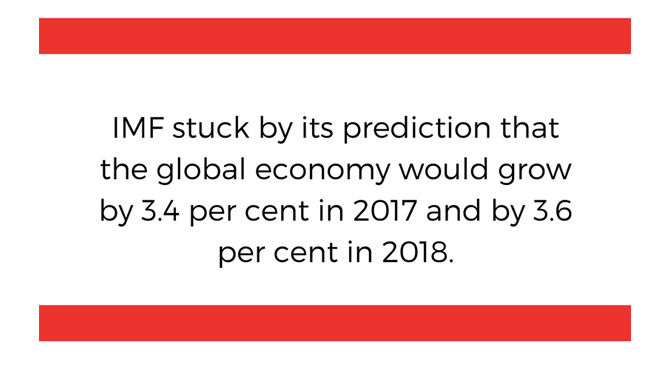IMF chief fearful of downside risks in global economy
The growth forecast for the global economy for both this year and next has remained unchanged in the International Monetary Fund's latest report, although UK growth is expected to increase.

IMF predicts an increase in global growth
As a result of a much better than expected economic performance since the referendum vote to leave the European Union, the IMF said it now expected the UK to grow by 1.5 per cent this year, up from 1.1 per cent previously forecast. However, Brexit uncertainty resulted in a downgrade of economic growth from 1.7 to 1.4 per cent in 2018.In its latest World Economic Outlook, the IMF stuck by its prediction that the global economy would grow by 3.4 per cent in 2017 and by 3.6 per cent in 2018.Trump: tax cut and spending plans
In a statement, IMF chief economist Maurice Obstfeld cited Donald Trump's proposed tax cut and spending plans as an upside for growth, but he added there was "a wider than usual range of upside and downside risks to this forecast".The IMF remains worried by Mr Trump's election claim that he wanted to impose a 45 per cent tariff on Chinese imports and its forecast was compiled before his latest statement that German cars made in Mexico would be subject to a 35 per cent import tax in the US.- Trump willing to do ‘quick’ post-Brexit US-UK trade deal
- Davos 2017: China president calms stormy economic waters
- May rules out single market and free movement
- The Brexit dividend – a boost for global cities?
IMF's global forecast
The IMF marginally increased its forecast for US growth this year to 2.3 per cent and to 2.5 per cent in 2018, while the forecast for Chinese GDP growth in 2017 was revised upwards from 6.2 to 6.5 per cent. India was predicted to grow 7.2 per cent this year and 7.7 per cent next, representing a reduction from previous forecasts.Over the next two years, emerging market and developing economies were predicted to grow by 4.5 and 4.8 per cent. Growth expectations for the Asean-5, Latin America, the Caribbean and the Middle East were all marked down, while the IMF said it expected the decline in Russia and Brazil would probably end, though neither country was predicted to experience strong growth.According to the IMF report, "Preliminary third-quarter growth figures were somewhat stronger than previously forecast in some economies, such as Spain and the United Kingdom, where domestic demand held up better than expected in the aftermath of the Brexit vote."The forecast was published hours ahead of official figures showing the UK inflation rate jumped in December to 1.6 per cent, its highest level in two and a half years last though still below the government target of two per cent.Office for National Statistics and Consumer Price Index
The Office for National Statistics (ONS) said the Consumer Price Index was up from 1.2 per cent in November while the Producer Price Index rose 2.7 per cent year-on-year in December as manufacturers began to pass on higher costs of imported raw materials following the fall in the value of sterling.Mike Prestwood, head of ONS inflation data, said, "This is the highest CPI has been for over two years, though the annual rate remains below the Bank of England's target and low by historical standards."Rising air fares and food prices, along with petrol prices falling less than last December, all helped to push up the rate of inflation. Rising raw material costs also continued to push up the prices of goods leaving factories."More news and features about Enterprise and International AssignmentsAccess hundreds of global services and suppliers in our Online Directory Get access to our free Global Mobility Toolkit
Get access to our free Global Mobility Toolkit 
©2026 Re:locate magazine, published by Profile Locations, Spray Hill, Hastings Road, Lamberhurst, Kent TN3 8JB. All rights reserved. This publication (or any part thereof) may not be reproduced in any form without the prior written permission of Profile Locations. Profile Locations accepts no liability for the accuracy of the contents or any opinions expressed herein.























